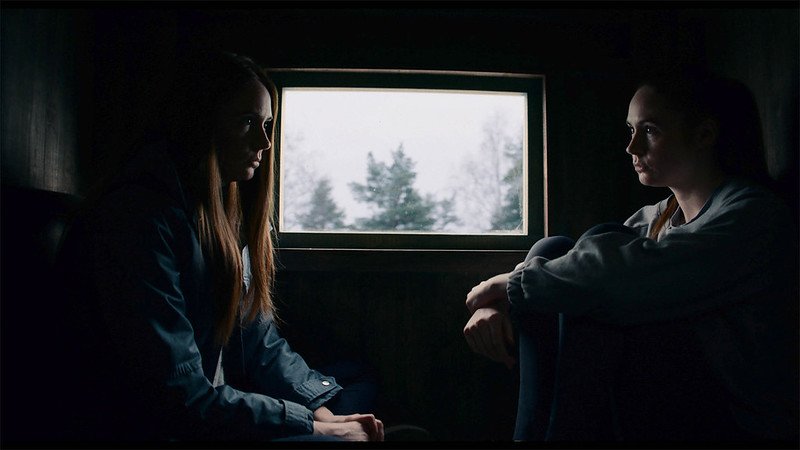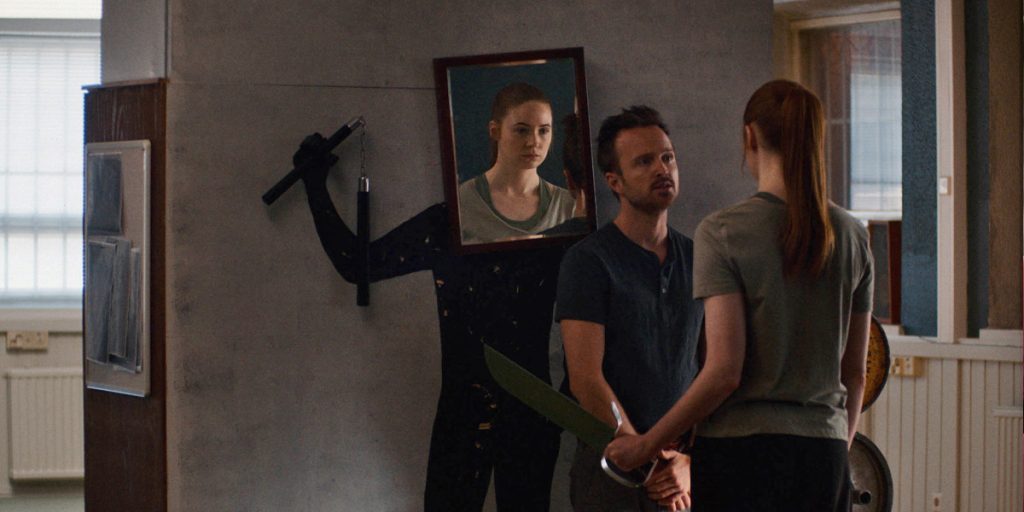Dual presents a compelling sci-fi concept and has a solid start, but it stumbles in the home stretch, despite the best efforts of star Karen Gillan.
After the considerable critical success of 2019’s The Art of Self-Defense, all eyes were on Riley Stearns to see what subject matter he’d tackle next after so skillfully skewering toxic masculinity in his sophomore feature. And the best thing about a Riley Stearns film is that, even if you hear its logline ahead of time, you rarely know exactly what to expect, as his signature satirical style contorts his initial concepts into entirely original concoctions by the end, making each of his movies memorable experiences that could be created by no one else.
Therefore, even though his latest feature Dual sounds similar to last year’s Mahershala Ali-starring Swan Song – concerning a woman in the near future named Sarah (Karen Gillan, of Guardians of the Galaxy and Jumanji) who learns that she is terminally ill and goes through a cloning procedure to save her family from the pain of losing her – Stearns puts a shocking twist on his take of this story, with a wrinkle in Sarah’s character arc: when Sarah makes a miraculous recovery, she learns that she cannot coexist at the same time as her clone and, by law, she and her clone must duel to the death to see who is allowed to live on as the one true Sarah.
It’s a sensational hook for a sci-fi flick, and Dual does get off to a solid start, but, unfortunately, in spite of Karen Gillan’s great work in the lead role and some brilliant world-building, all the pieces of this picture don’t come together as clearly as they did in Stearns’ past projects, and an uneventful ending leaves things on a lackluster note.
No one will ever describe a Riley Stearns film as being devoid of creativity, and such is still the case here – the situation he sets up for Sarah is intriguingly imaginative, and we soon have a genuine fascination with not just the history behind the violent government sanctioned skirmishes between humans and clones but also the way such an innovative procedure as cloning impacts one’s interpersonal relationships. What if a parent or a partner preferred your clone to you, as is the case for Sarah? And what if that preference continued even when it was revealed that you wouldn’t be passing on? Stearns dives into the discomfort of these relationships with reckless abandon, forcing us to confront the horrible coarseness of these conversations head-on, complete with his dry and dark humor mixed into the matters.

There’s also some slightly compelling social commentary about reality TV and our culture’s tendency to be thrilled by televised violence (Why can’t the clones coexist? Is this dueling solely perpetuated to feed our need for brutal bombast?), but it’s not resolved as well as it could have been, and that’s a core issue with Dual as a whole. Though Stearns excels when he’s just focused on investigating the interiority of Sarah’s psyche and probing her personal relationships, his surveying of Dual’s larger themes falls short, and that’s most evident in the flimsy finale, which ends with a whimper instead of a bang.
There’s nothing wrong with subverting audience’s expectations (Rian Johnson has made a whole career out of doing so very successfully, no matter what The Last Jedi’s detractors say), but when your film is gradually – and clearly – building up to a significant showdown and you take an abrupt left turn, that final destination should, ideally, be just as thematically thrilling and simply engaging as surface-level entertainment at the very least, but Dual squanders its initial potential in favor of a confusing conclusion that leaves audiences underwhelmed and asking questions instead of feeling emotionally satisfied by the film. It’s fine that Stearns wanted to take a “surprising” plot detour in the final third, but the problem is that the denouement simply doesn’t seem near as developed as every other act, leaving Sarah’s arc – and the story’s exploration of this engrossing subject matter – unfulfilled. Much of Dual is incredibly involving up until that point – Stearns’ acerbic wit remains as brilliantly biting as ever, the interplay between Gillan’s Sarah and her duel trainer, played by Breaking Bad’s Aaron Paul, is delightfully droll – but it remains hard to recommend due to that lack of resolution, making the prior journey less worthwhile than it would’ve been had Stearns come up with a more complete conclusion.
Regardless of the script’s stumbles, Gillan is a lovely lead for this darkly amusing adventure, perfectly aligned with Stearns’ comic sensibilities and doing the work to differentiate Sarah from her clone while assuring that both deliver his dryly humorous dialogue with equal efficiency. Some may find Gillan too “emotionally distant,” but those familiar with Stearns films will find that she’s playing the part of a Stearns protagonist with aesthetic and affective accuracy, while her progression of her physical prowess in the lead-up to the duel is just as believably portrayed. The aforementioned Paul is the only other member of the cast to leave a major impression beyond the “Gillans,” and while his Trent – Sarah’s trainer – is no match for Alessandro Nivola’s Sensei from The Art of Self-Defense, he carries himself with a similar blustery bravado that makes him a fascinating foil for Sarah as she prepares for the fight of their life. Dual is never more absorbing or alive than when these two share the screen, and it speaks to Paul’s powerful presence that you miss him every moment onward when he’s absent.
Though Stearns couldn’t quite replicate the slam dunk success of The Art of Self-Defense and its socially relevant and intellectually stimulating storytelling, Dual does offer decent entertainment in the moment, and Sterns’ deft direction (complemented by editor Sarah Beth Shapiro’s concise editing) infuses it with an enthralling energy that powers the picture almost the entire way through. It’s a shame it stumbles so badly by the time it finds itself at the finish line, as the flawed finale brings the entire film down a few notches, but that doesn’t discredit the great work Stearns turns in in the lead-up nor the persuasive commitment in Karen Gillan’s lead performance. If you’re a Stearns supporter or a genre fan with less discerning taste, it won’t hurt to give Dual a watch, but for more casual mainstream audiences, its story might prove too paltry in the end to fully satisfy.
Dual premiered at the Sundance Film Festival on January 22, 2022 and is now available to watch on digital and on demand.

